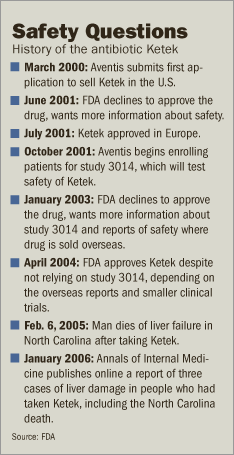The Wall Street Journal reported yesterday that the FDA approved Ketek, an antibiotic used for the treatment of respiratory infections, despite initially rejecting the study — called study 3014 — Aventis (now Sanofi-Aventis AG, based in Paris) submitted for the initial review. Instead, the FDA relied on adverse reaction data from European (French?) sources. See “Fraud, Errors Taint Key Study Of Widely Used Sanofi Drug. Despite Some Faked Results, FDA Approves Antibiotic; One Doctor’s Cocaine Use“; WSJ, Monday, May 1, 2006; subscription required). 
Now, the usual US Congressional suspects — including Grassley and Waxman — are asking questions about the agency’s handling of Ketek (“Lawmakers Ask FDA About Sanofi-Aventis Drug“; WSJ, Tuesday, May 2, 2006; subscription required).
It should be noted that at least a few deaths due to Ketek have been reported in the literature. As reported in a Health Canada warning to consumers: “An article in the Annals of Internal Medicine recently reported three cases of liver failure associated with Ketek. All three patients had jaundice (yellowing of the skin) and abnormal liver function. One patient recovered, one required a transplant, and one died.” (See Antibiotic Ketek and possible association with liver failure.)
All this comes to light just days after the Government Accounting Office (GAO) released a report suggesting the FDA cannot adequately monitor drug safety after launch and protect US citizens from harm (see “Spinning Bad News about FDA & Drug Safety“).
It’s ironic that the FDA and PhRMA — the pharmaceutical industry’s lobbying group — continually harp on the dangers of importing cheaper drugs from foreign sources (see “Terror Politics vs Drug Importation“) while the FDA seemingly relies on foreign data to approve drugs.
Why this special treatment for Ketek? Could it have something to do with the Anti-bioterrorism initiative?
Under that initiative, the US is stockpiling anti-infectives to protect US citizens in the event of a biological terrorist attack, which most likely would involve infecting the respiratory tract.
Could it be that the FDA fast tracked Ketek approval and ignored trial 3014, relying instead on data from non-US sources, in order to get a new anti-biotic into the strategic stockpile? If so, it sounds as fishy as handing over port security to a foreign corporation. In the case of Ketek, the FDA handed over drug safety to a foreign country (it may be France and not an Arab country, but in the eyes of the current Washington administration, this difference is slight).
I find it interesting that the book, “The Karasik Conspiracy,” which PhRMA once tried to commission to scare Americans about the threat of terrorism to our drug supply (see “PhRMA’s Terrorist Plot“), is about a plot to taint a drug to treat bacterial infections! “Ketek”, “Karasik”: get it?
BTW, when the “The Karasik Conspiracy” story blew up, PhRMA withdrew its support and the authors and publisher went ahead anyway, but changed the story to ream the drug industry a new one. In the published version of the book, a big US pharmaceutical company (PharmCorp, a fictitious name) is a major villain and unwittingly supplies the cash used by the terrorists. The company’s goal is to scare US citizens about buying drugs online: “What America needs,” says a PharmCorp VP, “is a good honest-to-god attack by terrorists using these damn Internet sites.”
In real life it turns out you don’t need a terrorist group to attack Americans with dangerous drugs. You just need a federal regulatory agency to approve a drug without enough credible drug safety data.









![6 Digital Tools at the Center of Healthcare Digitalization [INFOGRAPHIC]](http://ec2-54-175-84-28.compute-1.amazonaws.com/pharma-mkting.com/wp-content/uploads/2021/04/6DigitalTools_600px-100x70.jpg)




